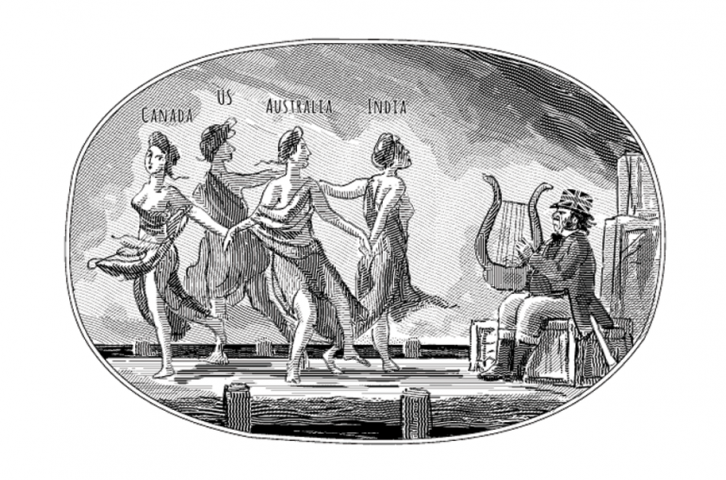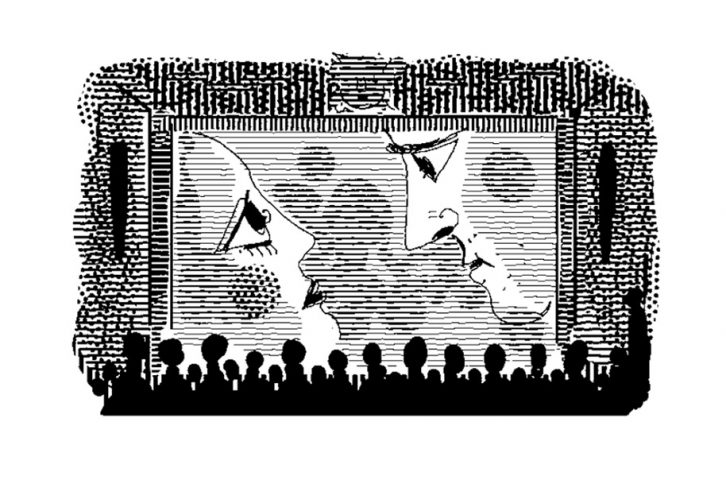Books Reviewed
A review of Inventing Freedom: How the English-Speaking Peoples Made the Modern World, by Daniel Hannan.
England in effect is insular, she is maritime, she is linked through her exchanges, her markets, her supply lines to the most diverse and often the most distant countries….
She has in all her doings very marked and very original habits and traditions. In short, the nature, the structure, the conjuncture that are England’s differ profoundly from those of the continentals.
So said Charles de Gaulle in his January 1963 press conference vetoing Britain’s admission to what was then the Common Market and now is the European Union (E.U.). Daniel Hannan, currently an elected member of the European Parliament from South East England and an advocate of British withdrawal from the E.U., couldn’t agree more. In Inventing Freedom (titled How We Invented Freedom in Britain) he explains why.
The whole idea of one nation or one group being superior in any respect infuriates contemporary academia. Today’s universities preach “multiculturalism,” which in practice means that all cultures are morally equal—except for ours, which is worse. But the facts tell another story. Nations are successful, Francis Fukuyama argues in The Origins of Political Order and Political Order and Political Decay (reviewed here in Spring 2011 and Fall 2014), if they develop an effective state, the rule of law, and political accountability. His shorthand phrase for this is “getting to Denmark.” But of course it is not the Danes but the English-speaking peoples, as Hannan calls them, echoing Winston Churchill, who have done this most effectively, starting, as Hannan says, with the United Kingdom, and then the United States, Canada, Australia, New Zealand, and more recently Ireland, Singapore, Hong Kong, and, he hopes, India. As for Denmark, Hannan notes that the Scandinavian countries, the Hanseatic cities, and the Netherlands—linked with Britain across the highways of the North Sea and the Baltic—have made similar progress, and, he might have added, have become effectively English-speaking in the last half-century.
* * *
All states develop according to the DNA that was fixed at the moment of their conception,” he writes. For Britain that moment was in the distant Anglo-Saxon past when the isolated island developed forms of representative government, elective kingship, and a unitary state, in that order. He cites historian Alan Macfarlane’s discovery that the English also had a culture of the “absolute nuclear family,” in which parents were free to disinherit and children to choose spouses, in contrast to the dominance of extended families prevailing then and now in continental Europe. That’s a point emphasized even more strongly in James Bennett and Michael Lotus’s America 3.0 (reviewed here in Fall 2014); both books agree that the result is that the right to own and dispose of property has been stronger in England than in Europe for at least a thousand years. From which you get the rule of law, binding even on the monarch.
Hannan is surely correct in saying origins matter, and Bennett and Lotus are surely right in saying that culture tends to control. But, as Churchill insisted in his History of the English-Speaking Peoples (1956-58), and as he indisputably demonstrated in his own life, individuals matter, too—sometimes a whole lot. Hannan gives us a largely political account of the invention of freedom, with many zigs and zags along the way. The Norman conquest of England in 1066 resulted in an attempt to impose continental feudalism on a non-peasant people. It failed because, as the writer Gay Talese said of the current proprietor of the New York Times, “Sometimes you get a bad king.” King John was forced to sign Magna Carta (the British omit the “the”), guaranteeing “the Law of the land”—celebrating its octocentennial this summer. Fifty years after Magna Carta, Simon de Montfort rebelled against John’s son Henry III and summoned what amounted to the first Parliament, itself an echo of the Saxon Witan. The roots of Fukuyama’s trio—effective state, rule of law, democratic accountability—were planted pretty firmly in English soil three-quarters of a millennium ago.
* * *
They weathered numerous storms in the religious-war-torn 17th century, even as absolutist government gained ground on the Continent—yes, even in Denmark. Puritans rebelled against Charles I, who had ruled for 11 years without a Parliament; when he was beheaded, it was done pursuant to an act of Parliament (albeit one denuded of most of its members). After Oliver Cromwell’s death, Parliament restored the monarchy, but the Stuart kings Charles II and James II were seen as too cozy with their absolutist cousin Louis XIV. James’s Catholicism and his suspension of laws passed by Parliament (sound familiar?) prompted the Glorious Revolution of 1688; Parliament offered the crown to his son-in-law (and nephew) the Dutch William III and his Protestant wife Mary, in a ceremony in which they accepted a Bill of Rights—parts of which were copied into our own Bill of Rights almost exactly a hundred years later.
England’s guarantee of rights established the principle that the king could only spend monies appropriated by Parliament, which has met every year since. It also meant a tolerance of religious diversity, of a sort found on the Continent only in William’s Netherlands. England had an established church (as did Scotland and Ireland) to which public officials had to swear fealty. But people could practice other religions, including Judaism—including even Catholicism, which the English at the time considered a sort of totalitarianism. The British North American colonies—Calvinist-founded New England, Anglican-adhering Virginia, Catholic-founded Maryland, Quaker-founded Pennslvania—had similar religious diversity, so throughout the Anglosphere there was something like free-market competition among religions, as compared to the monopolies enforced in almost all of Europe.
* * *
Hannan is at pains to make sure readers understand that English-invented freedoms were not formed by or for any one ethnic group—that they are open to all. He makes brief reference to historian Gregory Clark’s evidence that English institutions may have encouraged high-intelligence people to have more children than others, but he puts much more emphasis on the diversity of ethnic origin of those exercising English-invented freedoms in the Anglosphere not only today but in the pretty distant past. The Anglo-Saxons did not wipe out the Celtic Britons, he argues, but intermarried with them; the Normans did not displace the Saxons; and Cromwell was pleased to welcome back the Jews expelled in 1290. The North American colonies were multireligious and multiethnic from the beginning; Canada is multilingual as well; Canada and Australia have been welcoming high-skilled Asian immigrants; New Zealand has a large and politically active Maori minority; and India—well, India is more multiethnic, multilingual, and multireligious than the whole continent of Europe taken together.
It has been only in the last 325 years, since the Glorious Revolution, that the Anglosphere (a term invented only in 1995, Hannan notes) has expanded to become the dominant world power. During the Wars of the Roses and under the Tudors and the Stuarts, the English stayed pretty much island-bound (except for limited colonization in the Americas). King William III, observes Hannan, wanted the English throne to help him defend Holland against the expansionist Louis XIV, and he got Parliament to finance the first of several hugely expensive wars against France that raged, on and off, until Waterloo in 1815. London’s commercial power, based on property rights and the hard currency wrought by the Bank of England, enabled Britain to borrow at low rates and prevail against a France that had four times the population.
Parliamentary power was especially vital because of the cloud hanging over the monarch’s title much of this time. James II’s Catholic son and grandson laid claim to the throne and led armies into Britain in 1715 and 1745. William (who reigned 1689–1702) was resented as a Dutchman and George I (1714-27) and George II (1727-60) were Germans; George I spoke to his ministers in French. George III (1760–1820) was thoroughly English, but the British colonials in North America believed he was abridging their rights as Englishmen, rights enshrined in the Glorious Revolution settlement and asserted alongside their natural rights in the Declaration of Independence and later enshrined in the U.S. Constitution and Bill of Rights. Hannan calls the American Revolution the Second English Civil War.
* * *
From William’s time on, Britain and, in the 20th century, the United States have fought wars against hegemonic, absolutist, and totalitarian governments that threatened to dominate Europe, and the world. They prevailed against France, against the kaiser’s Germany, against the Nazis and imperial Japan, and, largely bloodlessly, against the Communist Soviet Union. In the process they have made the English model of an effective state, the rule of law, and democratic accountability the goal, and very often the achievement, of nations the world over—and have made the English language the lingua franca of the world and even, to the discomfort of some of Hannan’s colleagues, of the European Parliament. Charles de Gaulle, who was fluent in English himself, would have disapproved, but he would have understood. Hannan begins Inventing Freedom by recounting the religious service held on the HMS Prince of Wales in Argentia Harbour, Newfoundland, at which Winston Churchill and Franklin Roosevelt met on August 10, 1941. Britain had survived, with America’s help, the terrible months between the fall of France and Hitler’s invasion of the Soviet Union—months in which Hitler and Stalin and Tojo were allies and were advancing toward control of Eurasia. “As for the role England played in the most dramatic and decisive moments of the Second World War,” de Gaulle, who was in London in those years, said in 1963, “no one has a right to forget it.”
Churchill in his histories did his part to make sure no one did. Looking back on the church service and the reading of verses in the King James Bible, he noted, “This service was felt by us all to be a deeply moving expression of the unity of faith of our two peoples, and none who took part in it will forget the spectacle presented that sunlit morning on the crowded quarterdeck—the symbolism of the Union Jack and the Stars and Stripes draped side by side on the pulpit…. Every word seemed to stir the heart.” English speakers did, as Daniel Hannan argues, pretty much invent freedom, and we are among the many millions who owe much to those two eloquent English-speaking statesmen on the quarterdeck who did as much as anyone ever has to preserve and advance it around the world.




